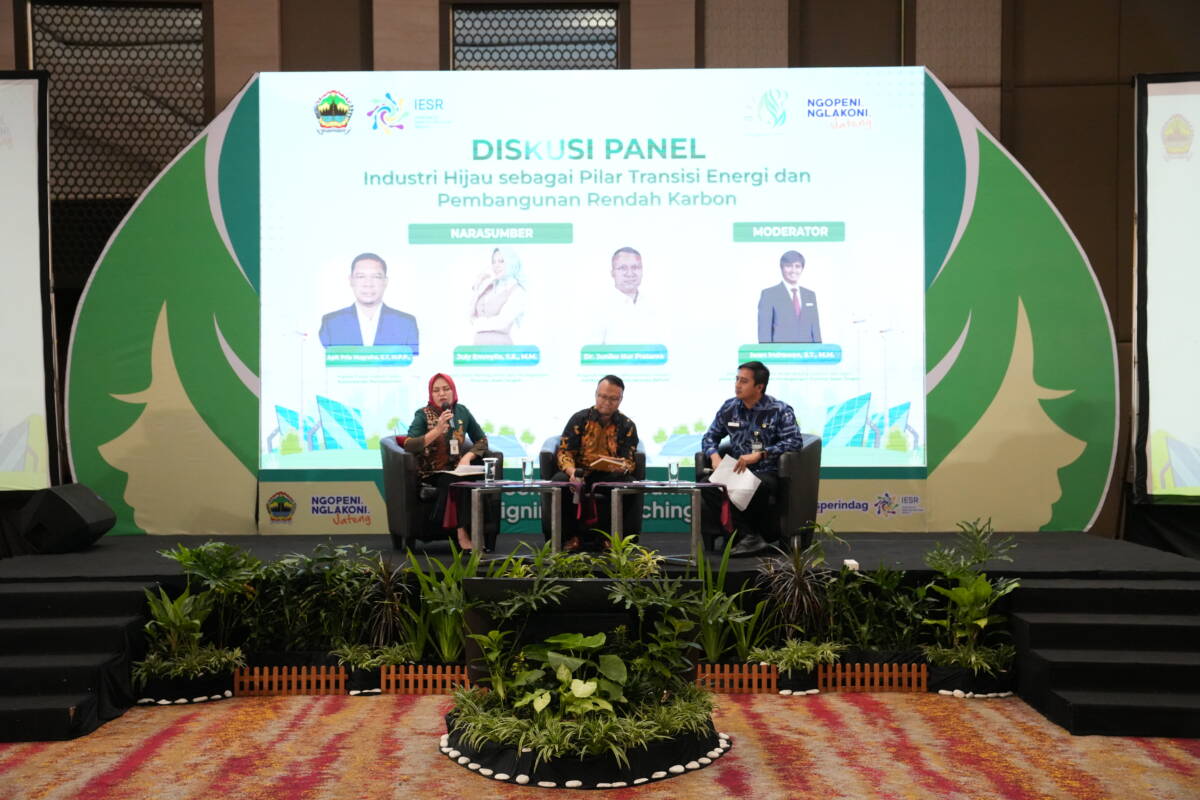Semarang, September 18, 2025 – The green industry represents a critical pillar in advancing the energy transition and low-carbon development. Through the adoption of efficient technologies, the use of renewable energy, environmentally friendly production processes, and the integration of sustainability principles, the green industry not only reduces greenhouse gas emissions but also strengthens national economic competitiveness. This transformation ensures that industrial growth aligns with the net zero emission (NZE) 2060 target, or sooner, while simultaneously opening new opportunities within global supply chains that increasingly demand sustainable practices.
According to Juniko Nur Pratama, Industry Decarbonization Program Manager at the Institute for Essential Services Reform (IESR), support for small and medium industries (IKM) is crucial in driving this transformation. Current assistance efforts, although ongoing, require stronger integration. While SMEs have begun adopting greener practices, exposure to and awareness of these practices remain limited. Moreover, existing capacities, both in human resources and financing, must be significantly strengthened to better prepare IKM for competitiveness in global markets that are increasingly oriented toward sustainability.
“Green industry assistance must become a norm in national industrial planning, not merely a temporary program. We at IESR are ready to collaborate with all stakeholders to establish an ecosystem that supports a just and inclusive energy transition, design incentive systems, and ensure that industrial policies are aligned with the NZE 2050 target,” Juniko emphasized during the Central Java Green Industry Summit 2025: Green Industry as a Pillar of Energy Transition and Low-Carbon Development, organized by IESR in partnership with the Central Java Provincial Government on Thursday (September 18).
IESR advocates for support programs to be aligned with priority sectors in the industrial decarbonization roadmap such as steel, cement and textiles, while preparing industries to anticipate carbon pricing mechanisms and accelerating the transition toward low-carbon technologies, including the adoption of hydrogen-based solutions.
July Emmylia, Head of the Central Java Provincial Industry and Trade Office, acknowledged that the implementation of green industry practices in the province remains far from optimal, largely due to limited awareness among industrial actors, financial constraints, and the absence of regional regulations and effective communication forums. To address these challenges, the provincial government launched the “Rengganis Pintar” program, a green industry revitalization initiative aimed at boosting exports. The program includes the establishment of a Green Industry Forum, the development of a Green Readiness Index (Indeks Siap Hijau/ISH) in collaboration with academia and strategic partners such as IESR, and the integration of green culture education at the high school and vocational school levels. In addition, the government introduced the Green Clinic (offline) and Klik Hijau (online) as consultation and support platforms for industries seeking transformation.
“Collaboration is the key to accelerating the green industry. This forum is the result of a strong commitment by various stakeholders including government, think tanks, academia, businesses, and communities to jointly formulate policies, share ideas, and drive innovation in the implementation of green industry in Central Java,” Emy asserted.
Meanwhile, Apit Pria Nugraha, Head of the Green Industry Center at the Ministry of Industry, stressed that all industrial companies producing emissions must be held accountable for the emissions they generate. The ministry’s strategy for building a green industry ecosystem focuses on promoting best practices that have long been adopted in other countries, including the European Union, which has enforced emission restrictions for decades. This approach is essential to enable Indonesia’s industries to transition toward sustainability while enhancing global competitiveness.
As part of the forum, the Institute for Essential Services Reform (IESR), the Central Java Provincial Government and Universitas Sebelas Maret (UNS) signed a Memorandum of Understanding (MoU) on green industry transformation support. This agreement is intended to serve as a foundation for establishing a synergistic and mutually beneficial collaboration to accelerate the green industry transition in Central Java. Through this partnership, IESR, the Central Java Provincial Government and UNS are committed to building a competitive, sustainable and environmentally friendly industrial ecosystem, with the main focus on collaborative support for the green industry transformation.

